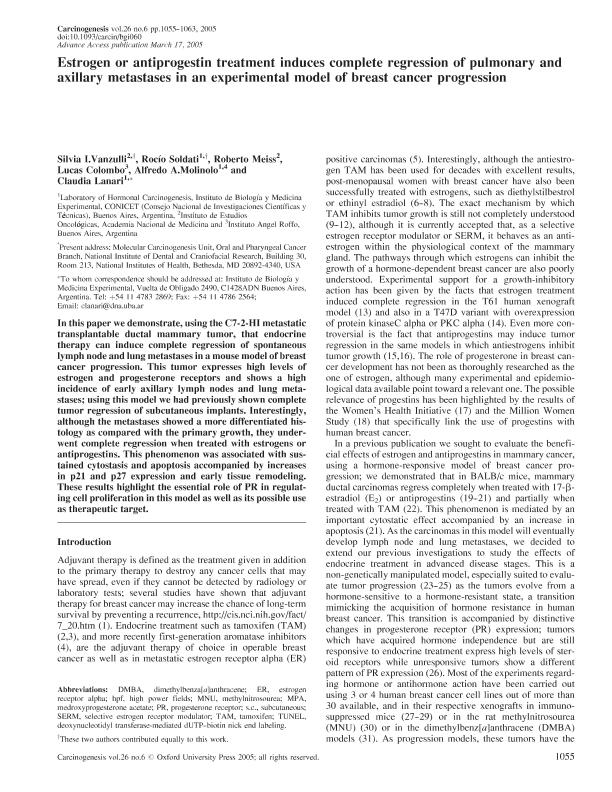Artículo
Estrogen or antiprogestin treatment induces complete regression of pulmonary and axillary metastases in an experimental model of breast cancer progression
Vanzulli, Silvia; Soldati, Rocío; Meiss, Roberto; Colombo, Lucas Luis ; Molinolo, Alfredo; Lanari, Claudia Lee Malvina
; Molinolo, Alfredo; Lanari, Claudia Lee Malvina
 ; Molinolo, Alfredo; Lanari, Claudia Lee Malvina
; Molinolo, Alfredo; Lanari, Claudia Lee Malvina
Fecha de publicación:
17/03/2005
Editorial:
Oxford University Press
Revista:
Carcinogenesis
ISSN:
0143-3334
Idioma:
Inglés
Tipo de recurso:
Artículo publicado
Clasificación temática:
Resumen
In this paper we demonstrate, using the C7-2-HI metastatic transplantable ductal mammary tumor, that endocrine therapy can induce complete regression of spontaneous lymph node and lung metastases in a mouse model of breast cancer progression. This tumor expresses high levels of estrogen and progesterone receptors and shows a high incidence of early axillary lymph nodes and lung metastases; using this model we had previously shown complete tumor regression of subcutaneous implants. Interestingly, although the metastases showed a more differentiated histology as compared with the primary growth, they underwent complete regression when treated with estrogens or antiprogestins. This phenomenon was associated with sustained cytostasis and apoptosis accompanied by increases in p21 and p27 expression and early tissue remodeling. These results highlight the essential role of PR in regulating cell proliferation in this model as well as its possible use as therapeutic target.
Palabras clave:
Mammary Carcinomas
,
Metastasis
,
Antiprogestins
,
Treatment
Archivos asociados
Licencia
Identificadores
Colecciones
Articulos(IBYME)
Articulos de INST.DE BIOLOGIA Y MEDICINA EXPERIMENTAL (I)
Articulos de INST.DE BIOLOGIA Y MEDICINA EXPERIMENTAL (I)
Articulos(OCA HOUSSAY)
Articulos de OFICINA DE COORDINACION ADMINISTRATIVA HOUSSAY
Articulos de OFICINA DE COORDINACION ADMINISTRATIVA HOUSSAY
Citación
Vanzulli, Silvia; Soldati, Rocío; Meiss, Roberto; Colombo, Lucas Luis; Molinolo, Alfredo; et al.; Estrogen or antiprogestin treatment induces complete regression of pulmonary and axillary metastases in an experimental model of breast cancer progression; Oxford University Press; Carcinogenesis; 26; 6; 17-3-2005; 1055-1063
Compartir
Altmétricas



